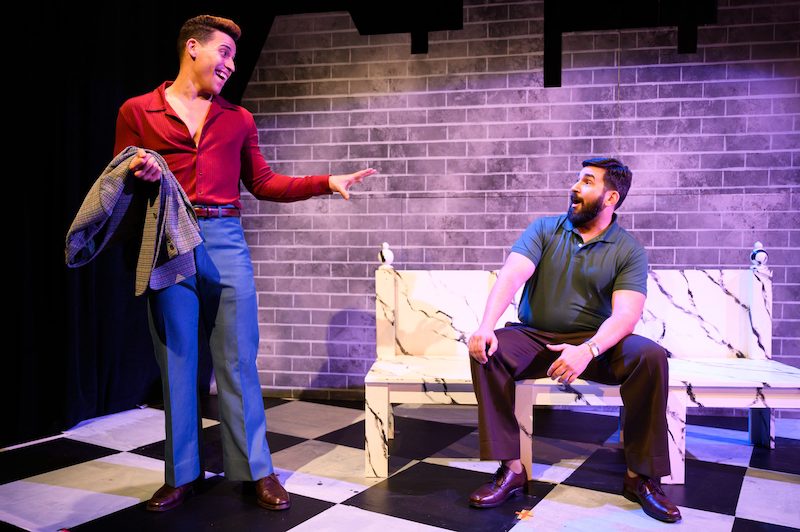
The young woman with the knit hat and notebook a few seats to my left at the 42nd Street Moon production of “Falsettos” last Saturday night was in her early twenties; about the same age I was in 1984 when I saw the show’s first act—then a standalone piece called “March of the Falsettos”—presented on a makeshift stage in a college dining hall.
Watching her face repeatedly crumple into tears over the show’s extended denouement provided reassurance that my abiding affection for this work goes beyond wet-eyed nostalgia for my baby gay days (Something I’d begun to suspect after seeing a disappointing Broadway revival tour at the Golden Gate Theatre in 2019).
Her reaction also served as a testament to the ultimate emotional wallop of composer William Finn’s crossword-worthy lyrics and sung-through score. The music’s impact is strong enough to overcome some sorely dated characterizations and relationships co-created with original director James Lapine.
Dated duos
The big swinging albatross of “Falsettos” is that it strives to normalize same-sex partnerships while simultaneously reinforcing stereotypical roles within its three fictional couples.
It’s 1979 when we meet fortyish Marvin (William Giammona, courageously embracing his character’s unpleasantness), around whom the show—and in his mind, the universe—revolves.
He’s recently left his wife, Trina (Ariela Morgenstern), and 11-year-old son Jason to move in with his younger boyfriend, upbeat and level-headed Whizzer (Samuel Prince).
Trina has long bridled at playing the happy housewife of Marvin’s fantasies (Well, one set of them). She provides hot dinner and a frequently forced smile when he returns from his well-paying, unspecified office job each day.
But what she might want instead is unclear—and made no more so after she continues this routine after getting remarried to Mendel (Gary Brintz), a psychiatrist whose free love 1970s professional ethics are as loose as his dashikis (Stephanie Dittbern’s costumes are accurate enough to provoke retrospective embarrassment).
Meanwhile, beyond their sex lives, Marvin makes the same demands of Whizzer as he did of Trina. Finn and Lapine’s paltry representation of a male couple consists of a professional working man and stay-at-home gold-digger pretty boy (Giammona and Prince help compensate with thoughtfully textured performances).
The second act, set in 1981, introduces a lesbian couple: A butch, unkempt doctor (Cindy Goldfield) and a winsome, ditzy would-be caterer who calls her partner “Mommy” (Monica Rose Slater).
It’d be hard to blame a Zillenial for rushing to an emergency exit.

Transcendence through sorrow
But there are rich rewards for sticking with “Falsettos”, presaged by Act I’s closing song, “Father to Son”. With a far tighter narrative structure, Act II galvanizes the selfish, shapeless yowls and yearnings of its prologue into momentous storylines with eternal urgency.
As much as it flounders with coupled romantic relationships, “Falsettos” does a beautiful job at eliciting the complex intertwinement of a child and the community of loving adults around him.
It also underscores the mutual compassion and shared humanity that can emerge in the face of tragedy.
As Jason prepares for his impending bar mitzvah, we sense the tug between his wish for independence and his craving for protection. (Madelyn Simon, who alternates with Yuval Weissberg, plays Jason with unprecocious naturalism).
And we see Marvin and Trina, who have inflicted so much hurt on their son, desperately wishing they could protect him from the pain of the wider world.
That pain and its attendant sense of helplessness are embodied by Whizzer’s battle with AIDS, which serves, with cruel irony, as a catalyst for community. The broken family and its circle of friends pull together, transcending their differences in shared sorrow.
As Whizzer, Samuel Prince brings a sheen of elevated charisma to the otherwise earthy, intimate performance style of director Dennis Lickteig’s production. As his castmates buzz about in harmonized neurosis, he moves and sings with a singular clarity and self-possession perfectly attuned to his character.
Prince’s Whizzer proves this “Falsettos”’ guiding star.
Follow him all the way to the bittersweet end.
